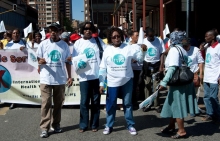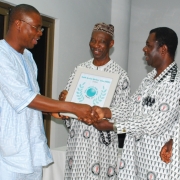Unions in Ghana, Kenya and South Africa work for a new era of social dialogue on migration and health care systems

The unions assist workers to make informed decisions about whether to migrate or not. Unions are reaching out to and organising migrant workers. Building unions’ ability to influence national and international migration, trade and labour policies and to collectively bargain for job security, training and promotion, pay equity and decent work are also project goals.
Following the dictates of the International Financial Institutions, for years African Governments ignored public sector union warnings that poor terms and conditions of health and social care workers would damage national health care systems. Since then, governments and their citizens have indeed mourned the damage caused by the ‘brain drain’ as tens, if not hundreds, of thousands of the most highly skilled and experienced workers are forced to migrate in search of better pay and working conditions, less stress and greater opportunities for career progression.
With IMPACT support, PSI worked with health affiliates in Ghana, Kenya and South Africa to carry out robust mapping and participatory research activities in order to document push and pull factors on workers. Training in peer to peer research techniques enabled 100 union members to interview 1,133 workers in major workplaces across the three countries and hold 52 focus groups. One trainee researcher summed up the enthusiasm for the project when they said:
“I am glad that somebody is doing that research – and that somebody is me”
The research, which strongly confirmed the correlation between an increase in pay and benefits and a decrease in the intention to migrate was then widely publicised in the media. The result is that the unions’ credibility with their governments and other agencies rose and contributed to an improvement in social dialogue and the strengthening of collective bargaining.
For example, in Ghana, commenting at the launch on the research findings, Dr Kwesi Asabir, Deputy Director, Ministry of Health said:
“The findings from the research do provide evidence that can be used for the policy process. Trade unions are best placed to carry these issues forward and inform workers”.
The Health Services Workers Union (HSWU) of Ghana, who used their own resources to scale up their research, were subsequently invited to join the high level Health Sector Interagency Committee, where all Chief Executives of the health regulatory bodies and hospitals meet to examine and determine policy and programmes. The HSWU is also assisting the World Health Organisation to implement the Code on Ethical Recruitment of Health Personnel.  Additionally, working with PSI’s Nigerian affiliates, HSWU used internal resources to extend solidarity to PSI’s affiliates from Sierra Leone and Liberia so that they could attend the research launch and workshop and find ways to apply the methodology back home. Because of this and persistent efforts which have resulted in significant improvements in working conditions for Ghanaian health workers, the HSWU was awarded PSI’s Quality Public Services Award in 2011.
Additionally, working with PSI’s Nigerian affiliates, HSWU used internal resources to extend solidarity to PSI’s affiliates from Sierra Leone and Liberia so that they could attend the research launch and workshop and find ways to apply the methodology back home. Because of this and persistent efforts which have resulted in significant improvements in working conditions for Ghanaian health workers, the HSWU was awarded PSI’s Quality Public Services Award in 2011.
Finally, in September 2012, unions in all three countries launched ‘the Migrant Desk’. This desk acts as a focal point and outreach programme within the trade unions and provides information, counselling, organising, support services and networking opportunities for migrants, prospective migrants and returning migrants. The unions are excited about the results this new era of social dialogue will bring for their members and health care systems.
This PSI project “Women and International Migration in the Health Sector” was supported by affiliates IMPACT (of Ireland) and Abvakabo (of Netherlands) in collaboration with FNV Mondiaal (a trade union solidarity support organisation from the Netherlands) and ILO Actrav (the Bureau for Workers Activities of the International Labour Organisation).
For a complete survey of IMPACT/PSI trade union development cooperation between 2008 and 2013 click here: In the People's Interest
Map: IMPACT/PSI project collaboration between 2008 and 2013

